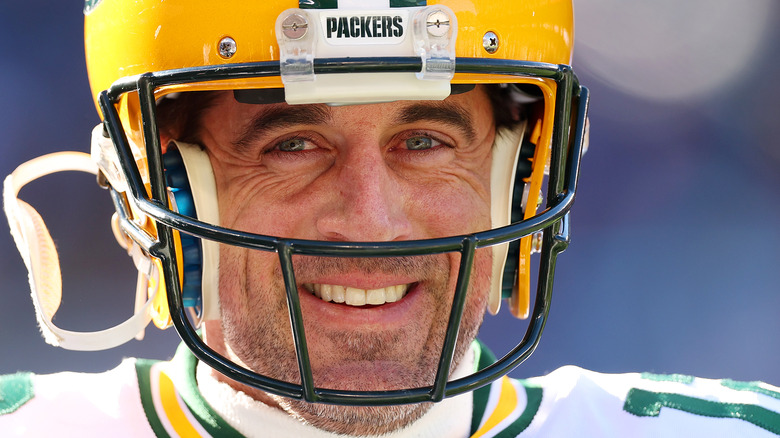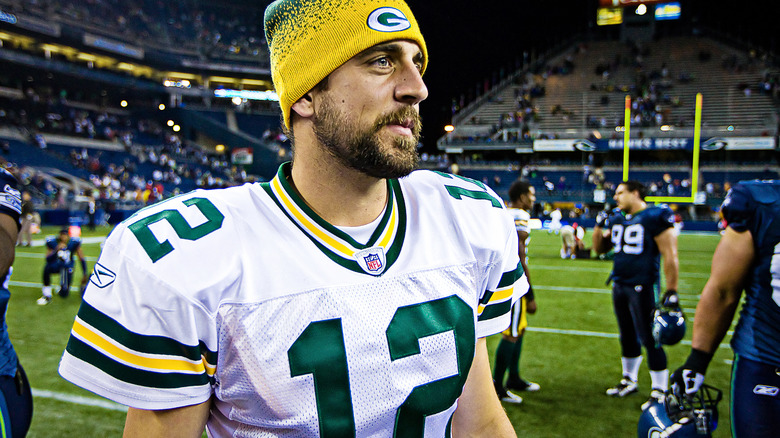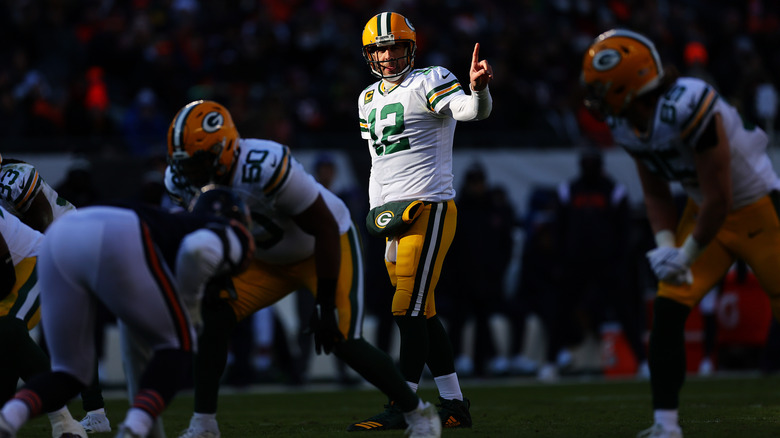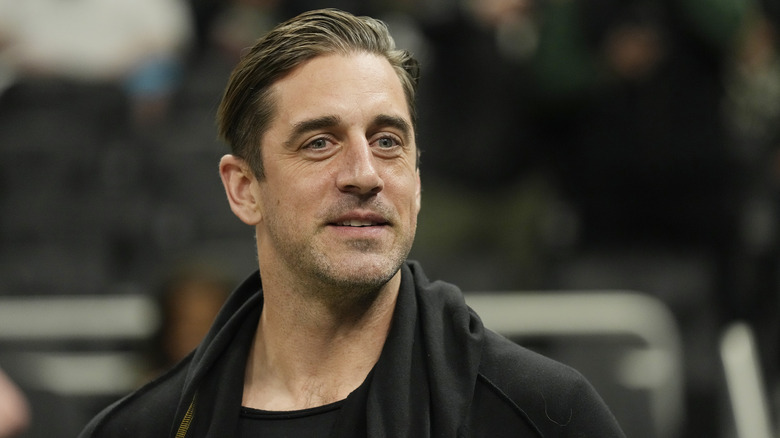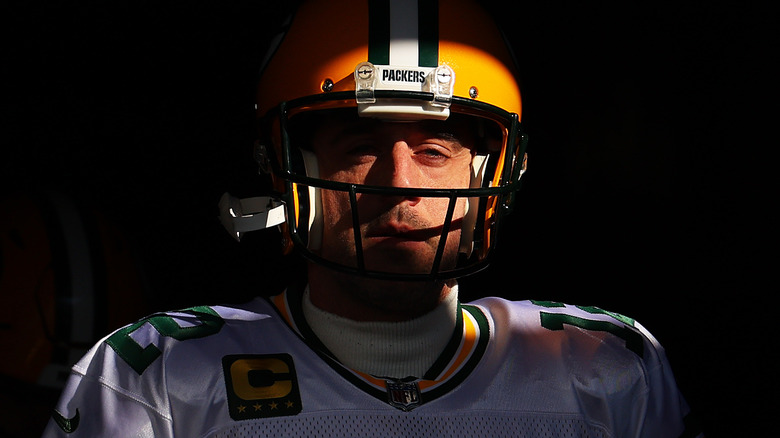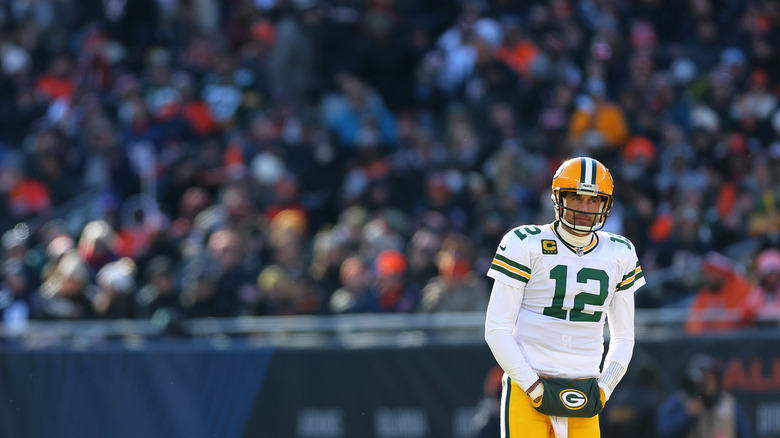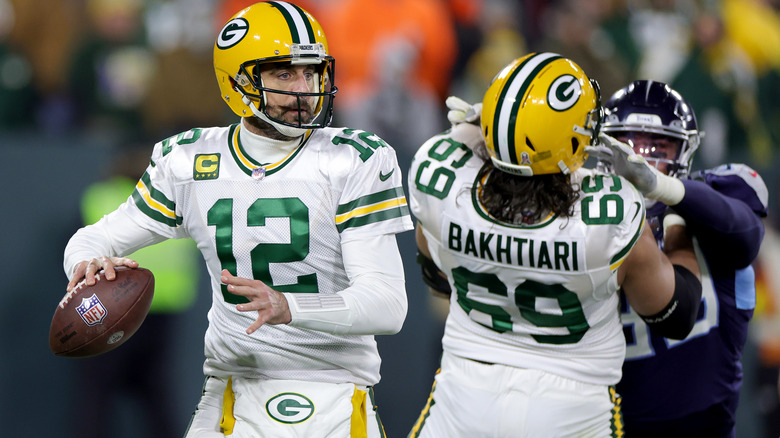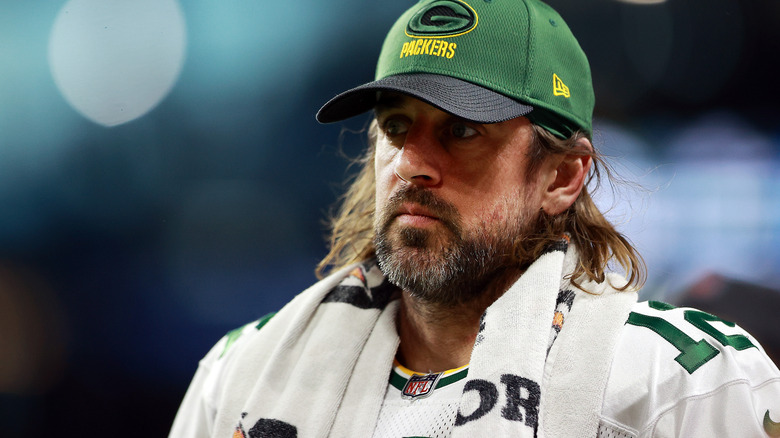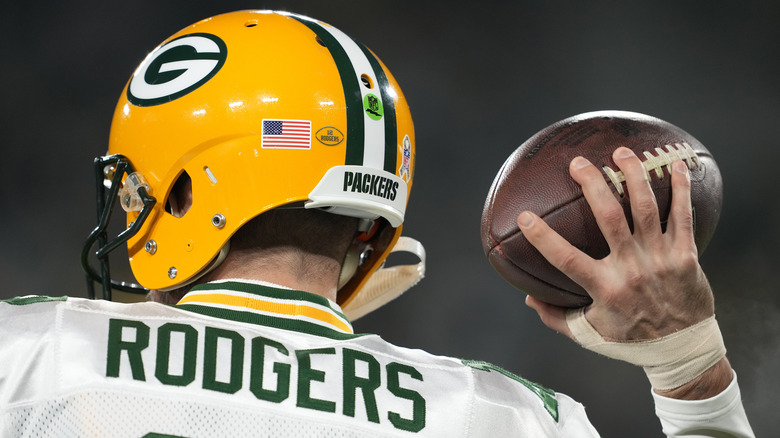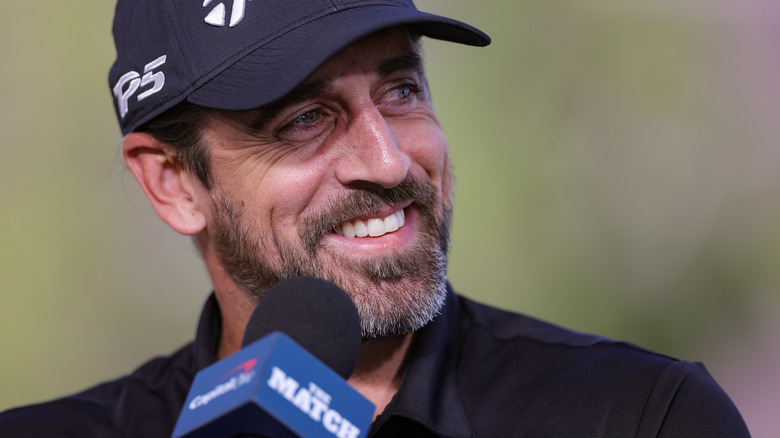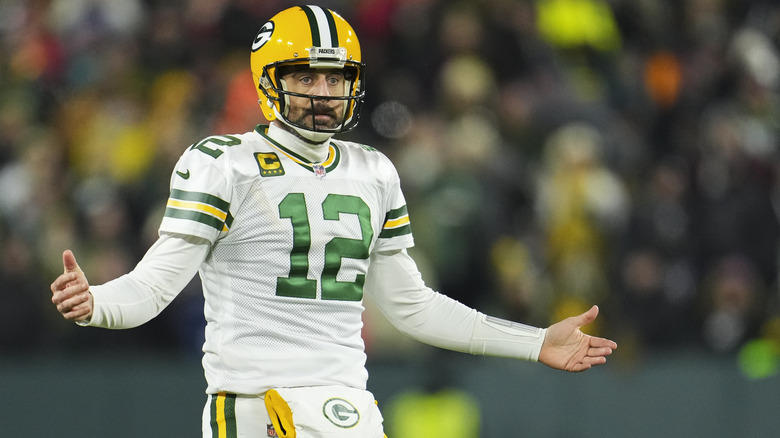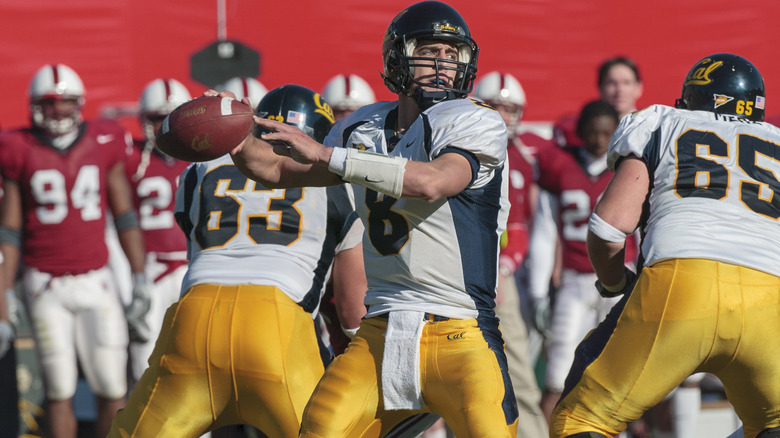Aaron Rogers: 11 Essential Facts For Football Fans
At a glance, the meteoric rise of Green Bay quarterback Aaron Rodgers is the stuff of inspirational TED Talks. While most big-name stars start making waves in high school and send colleges into a feeding frenzy during recruitment, CBS Sports points out that Rodgers had no college offers — in spite of setting records at his idyllic-sounding Pleasant Valley High School.
The California kid ended up heading to Butte Community College, and even though he led them to the NorCal Conference championship, he still wasn't on the radar of bigger colleges. In fact, he only got the attention of a recruiter who happened to be there for someone else. (That was Garrett Cross, a tight end who was also on his way to play for Green Bay when he decided to opt for military service instead.)
Rodgers didn't really have that much more luck when it came time for the draft, and after being a predicted favorite, ended up staying on the market until he became the No. 24 pick ... and quickly went to sit behind longtime favorite Brett Favre. In the years since, though, he's not only come into his own as a quarterback, but he's set records, won all the big games, and become a favorite not only of Green Bay but of his hometown of Chico, California. In the meantime, though, he's become incredibly polarizing as well. Here's what fans need to know about Aaron Rodgers.
The term billion can be used when discussing his salary
It's no secret that football players can make an almost obscene amount of money, so let's talk about Aaron Rodgers's net worth. But first, something for comparison. When ESPN looked back at the career of Green Bay quarterback Bart Starr, they called him one of the team's most beloved players — even after his retirement. In his final year — and after five championships — he was given his highest salary: $100,000. That was in 1971 and adjusted for inflation, that's just shy of $700,000 in today's money.
When Spotrac took a look at Rodgers' career earnings, that started out with an impressive $2,350,000 for his rookie year. While his salary fluctuated, there were some high-earning years in his 18-year career, including 2018 — worth $66.9 million. As of 2022, his to-date career earnings totaled an impressive $305,608,010, and when they estimated his earnings through the 2026 season, they put the total at $450,373,010 — in other words, nearly half a billion dollars.
That puts something else in perspective, too. In 2021, he was fined $14,650 for violating the league's COVID-19 rules. (It was officially called a fine for Conduct Detrimental to the Team.) While that might sound like a lot, it was actually only 0.004% of his earnings to date.
Aaron Rodgers is a fan of Total Human Optimization
In 2021, there were rumors that Rodgers wasn't too keen on returning to Green Bay. According to the Associated Press, he'd skipped a mandatory training camp and even opted for radio silence when it came to discussing future plans.
They confirmed that there were no plans in the works for a trade, and said that his only comments about plans involved what he'd been doing in the off-season: "I've focused on ... how to take care of myself — the total package. Not just my physical self with workouts, but my spiritual self with my own mindful practices, my mental health as well." Rodgers continued on to say that he wasn't dealing "with bouts of depression or anything that for whatever reason are OK to talk about," and it wasn't until later that he got into specifics.
In 2022, Rodgers appeared on the Aubrey Marcus Podcast. Marcus, says Yahoo!, is the entrepreneur behind the brand Onnit, which is rooted in a philosophy called Total Human Optimization. Rodgers and Marcus first met through Danica Patrick's podcast, and he was apparently already familiar with Marcus's teachings: He was such a fan that meeting him was nerve-wracking. So, what does it entail? According to what Marcus explained to the Art of Manliness, it's about living a holistic lifestyle and focusing on the use of things like workouts, all-natural supplements, and ancient practices to improve the entire self.
Fans wondered if his use of hallucinogenic substances would be a problem
In 2022, a fairly non-traditional end zone celebration got some attention: A group of Packers gathered around and appeared to use a football like a tea kettle, taking a drink from their imaginary mugs and then falling to the ground. CBS' Andrew Perloff thanked the Twitterverse for clarifying that it was a reference to ayahuasca.
It wasn't a random reference, either, and it turned out that Aaron Rodgers was a big fan. According to NBC Sports, ayahuasca was the hot topic leading up to the 2022 season, and Rodgers explained that after a friend had gone to South America to try it in 2019, he had tried it in 2020 and again over the 2022 off-season. He summed up his experience as one in which he "figur[ed] out what unconditional love of myself looks like," and added, "I think it's unlocked a lot of my heart."
Rodgers referred to psychedelics as a medicine, and according to Healthline, it's a brew that's been long used by Amazonian tribes in ceremonies. They say that it causes psychedelic effects, hallucinations, extreme feelings (that can include everything from euphoria to fear), and some major gastrointestinal complications. Would Rodgers' very public embrace of the practice interfere with the NFL's drug testing policies? No — not according to NFL spokesman Brian McCarthy (via The Guardian). (However, ayahuasca, says USA Today, is illegal in the U.S. and is classified alongside substances like heroin, ecstasy, and LSD.)
Aaron Rodgers is a fan of channeling the 'divine feminine'
Athletes, actors, musicians, artists ... look at the abilities of anyone at the top of their game, and there's a definite desire to look behind the curtain to see how they do it. Innate talent, superhuman skills, lots of practice, or something else?
In 2022, Aaron Rodgers addressed just that conversation when he appeared on the podcast of holistic health guru Aubrey Marcus (via The Mercury News). He credited his longevity in football and continued success to learning how to embrace "the divine feminine," and noted that it was something unusual in the ultra-masculine boys' club that was the NFL.
The typical NFL culture focused on things like competition, conflict, and dealing with failure in a way that might be not-so-healthy. By letting the divine feminine in — by embracing the poet as well as the warrior, as he explained — it had allowed him to become whole: "We have to have that poet side come in, and the feelings and vulnerability. That's what we were probably missing in this world. That's why masculinity can be toxic." Rodgers claimed that his new sense of balance and "the enjoyment, the beauty, and the sensuality" of life was absolutely what set him on the path to a few more MVP awards. "I really feel like that experience paved the way for me to have the best season of my career."
Aaron Rodgers has shifting attitudes toward faith
The NFL's biggest stars are also in the spotlight off the field, and when Aaron Rodgers not only headed to India on a humanitarian outreach mission but visited the Dalai Lama and hooked him up with some Packers swag, that's the stuff that memes are made of.
Rodgers talked about the trip with Artful Living, and although a big part of why he wanted to go was the mission — working with the Starkey Hearing Foundation to distribute hearing aids — another reason was to meet the Dalai Lama. A surprising aspiration? Yes, and Rodgers said as much, noting that he thought it was incredibly important to meet people from other cultures, countries, and faiths: "especially ... for someone like myself, who grew up in the Christian culture where there isn't a lot of open-mindednesses to learn about other people's ideas and beliefs."
In the latter part of his career, Rodgers has spoken more and more about faith, belief, and spirituality, telling ESPN that although he had grown up in a devout Christian household, he no longer identified with Christianity — or any other faith. He explained: "I think organized religion can have a mind-debilitating effect, because there is an exclusivity that can shut you out from being open to the world, to people, and energy, and love, and acceptance."
His estrangement from his family has been a topic of speculation
Aaron Rodgers's feud with his family is a speculated-upon topic — especially when, says The New York Times, everyone else in his hometown of Chico, California, seems to be on a first-name basis with the local boy who made it big.
Conflict in the Rodgers family went public in an equally big way: Younger brother and "The Bachelorette" contestant Jordan Rodgers let it slip on television that he'd removed himself from the family circle. More details started to come out, like the fact that the rift opened up just a few months after Rodgers started seeing Olivia Munn in 2014. While Rodgers refused to discuss what had happened publicly, his father has offered cryptic comments like, "Fame can change things."
The following years were filled with speculation, and little to no movement toward reconciliation or even a thaw in family relationships ... seemingly. In 2022, Rodgers addressed the matter on Aubrey Marcus's podcast, with Marcus saying that he had seen nothing but prayers and hope for reconciliation from Rodgers, but adding, "but, this is a co-created life, and it's not only up to you." Rodgers's response was telling, and while he said that he did believe there was a chance for healing and mending the broken relationship, "to judge on the outside about what should be or what it should look like or who's wrong and who's right, it's just a game I've never wanted to play and still don't want to play."
Aaron Rodgers was at the center of a vaccination uproar
Aaron Rodgers added some major fuel to the vaccination fire when, in 2021, he tested positive for COVID-19 after saying he had been "immunized" against the virus and went on to enjoy all the benefits his other vaccinated NFL colleagues had.
After his positive test went public, people started realizing that saying he was "immunized" wasn't the same thing as saying that he had been vaccinated. Rodgers was handed a fine, and ESPN said, at the time, Rodgers had gone through "alternative treatment" that he asked the NFL to recognize as good enough. They refused, and he just sort of shrugged and hoped he wouldn't get caught.
When Rodgers went on Joe Rogan's podcast to talk about the situation in 2022, he said that he had known his choice not to get vaccinated and instead go through a holistic immunization process was going to come out ... eventually. In spite of not being able to answer questions about how it worked and how they got the diluted COVID-19 strains he was reportedly taking, Rodgers repeated that he had done his research and made a conscious decision to use the term "immunized" in hopes of not being questioned further. That, it seems, is something he agrees with his family on. ESPN reports that his father — who is a chiropractor — referred to those who got vaccinated as "brainwashed liberal idiots" on social media.
He's not sure Trump's conspiracy theory about election rigging is wrong
Alongside the unfolding of's COVID-19 pandemic misinformation oopsie, Aaron Rodgers also found the time to share his support for the conspiracy theory that said the 2020 election was rigged. The opinion was shared in a January 2022 piece from ESPN in the midst of comments condemning the notion that people should get vaccinated. He said, "When the president of the United States says, 'This is a pandemic of the unvaccinated,' it's because him and his constituents, which, I don't know how there are any if you watch any of his attempts at public speaking, but I guess he got 81 million votes."
He went on to call the Biden administration "this fake White House" — and did Donald Trump's camp love it? Absolutely: Liz Harrington quickly gave a shout-out to Rodgers when she appeared on Steve Bannon's podcast, thanking him for questioning the legitimacy of President Joe Biden's election while never questioning Trump (via Rolling Stone).
It's also worth noting that this isn't the only conspiracy theory he believes: When ESPN (via The Spun) interviewed former Green Bay quarterback Seneca Wallace, he shared the idea that Rodgers is a big believer of chemtrails — or the idea that planes shoot out biological agents to land below them — once saying, "Do you think [chemtrails have] anything to do with maybe why everybody's getting cancer?"
There were massive consequences of his 'COVID toe' remarks
Fans of Aaron Rodgers may have seen his appearance on "The Pat McAfee Show," where he talked about a toe injury that he referred to as "COVID toe." He had broken his toe, but the incident came alongside his positive COVID test, leading him to make the comment, "I didn't have any lingering effects, other than the COVID toe."
The Wall Street Journal ran an article about the interview, and here's where things went off the rails. Sports journalist Molly Knight re-tweeted the article with the joke, "This is what happens when you get medical advice from Joe Rogan," and then added another tweet about the importance of getting vaccinated. Then, the death threats started.
Rodgers, says Sports Illustrated, had appeared in a press conference in which he had condemned the entire thing as misinformation, clarifying it was a broken toe, and saying, "I expect a full apology from Molly Knight." That kicked off a slew of harassment, even though Knight didn't write the article as Rodgers had claimed. The harassment got so bad that Knight had to leave her apartment over fears that someone would try to make good on their death threats, and even as Knight tried to convince people it wasn't her article, Rodgers doubled down: ESPN quoted him as explaining, "... she was piling on. It was a perfect storm for her to jump on this anti-vaxxer, flat-earther who ended up getting COVID toe."
Aaron Rodgers totally saw a UFO that one time
Aaron Rodgers was on The Pat McAfee Show when he was asked about the UFO that he definitely saw that one time and the story is ... something.
He went on to say that he, former teammate Steve Levy, and Levy's brother were at the brothers' New Jersey house on a dark, snowy night when they saw something in the sky. "It was orange, moving in the clouds from left to right, and the bizarre part that was associated with it was that after it went out of sight and we were frozen, looking at each other, wondering what the hell just happened, about 30 seconds later, we heard fighter jets."
The sound of the fighter jets was unmistakable, he said, adding that it seemed pretty clear to them that whatever the orange thing had been, the three fighter jets were chasing it. Rodgers said that Levy has confirmed the story is true and added that, in addition to doing a deep dive into close encounters, he had a few other UFO sightings, too. That, however, was the most vivid one, and he declined to share what the others were.
He's still friends with the coach who gave him a chance
Aaron Rodgers's rags-to-riches story is well-known, from not being scouted by a college team to falling pretty far down the list for the draft. But it only takes one person to believe enough to change a kid's life, and for Rodgers, that was Butte football coach Craig Rigsbee.
He, says The Washington Post, is the one that fought to have him on their very non-traditional football team and agreed to the caveat that Rodgers could play his way. It worked, it got him noticed, and Rodgers would later say it was that year of football that gave him the only thing he was really lacking: confidence.
Even after he gave Rogers the starting job, Rigsbee got hate mail condemning him for not having a clue about what he was doing. Still, Rodgers took the field, and according to ESPN, he's still good friends with the coach who gave him the chance. Now retired, Rigsbee has all the Green Bay swag anyone could want, keeps in regular contact with Rodgers — chatting or texting a few times a week — and the two even went backstage at a Counting Crows concert. And Rigsbee reportedly still understands him, saying of his estrangement with his family, "He's seen people be phony to him, he's seen his good friends dog him, his relatives dog him. You end up really shrinking your inner circle of friends."
